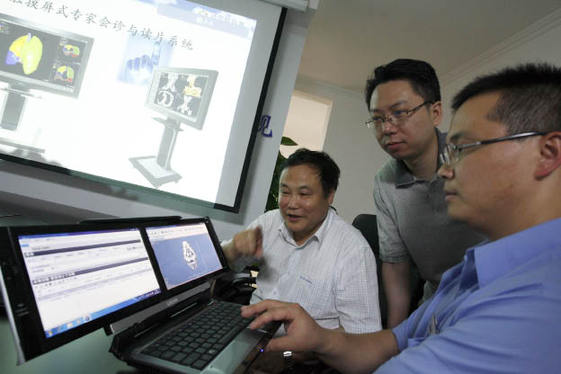IT Transforms Medical Services
 |
|
Locus Technology launched a “cloud” program in Beijing in June 2011 to expedite online management and wireless sharing of information from multiple hospitals. The system allows doctors quick access to a large network, thus enabling real-time diagnoses. |
A Big Emerging Market
According to an ABI Research report, the market value of wireless online medical services will reach US $1.34 billion by 2016, when 30 million mobile gadgets will be connected to wireless medical-care networks, and wearable medical sensors will number 100 million. These sensors might be a heart beat monitor, a blood-pressure gauge, or a bracelet gauging sleep quality. The data collected is automatically transferred by email to the wearers and their doctors for reference and analysis.
In the current situation of a grim imbalance in medical resource distribution, online services help meet the vital need of patients for better communication with their doctors. Surveys show that 64 percent of people are willing to try and pay for online medical services; 74 percent are open to wearable medical apparatus, all of them willing to pay; and 46 percent express a desire for medical consultations via mobile apps or networks, 75 percent of them willing to pay for the service.
Channeling of mobile medical services, voice messages and text messages is expected to give way to smart phones and mobile networks, with the latter taking predominance. Though most people accept a price tag for mobile medical services, cost remains a make-or-break factor. Service providers are therefore advised to levy low or no fees on customers, and resort to other operations for profits.
At present, medical apps in China are in three categories: the first is about self-diagnosis and remote consultation with doctors, as represented by Spring Rain; the second features disease management and post-surgery rehabilitation, Haodf.com being one example; and the third focuses on medication. An example is DXY, which offers advice on medication and the reading of medication guides.
According to a consultant with iiMedia Research, a world-famous third-party data mining and integrated marketing agency on the mobile Internet, mobile medical care has to overcome many obstacles before it can secure a footing in China. At present, medical resources still fall short of demand in the country, the accessibility level of public hospital information systems remaining low. Users of mobile healthcare services are relatively few and not active. How to generate a profit is also an issue. Spring Rain charges for online services, but paid customers account for only 5 percent of its clientele, and all their contributions go to the doctors. The question-and-answer function is free for users, but the website actually reaches into its own pocket to pay the responding doctors. The company seeks to make up the loss by soliciting advertisements for health products, like those for mothers and babies.
No matter what difficulties might be encountered at the startup stage, it is undeniable that the Internet is trending in the health-care sector, as it is in many other industries around the world.
